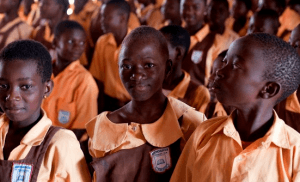Some 10% of families in Ghana have to borrow to send their children to school – Report
 For most families in Ghana, education is a priority, but it’s not affordable, and that’s in spite of a free education policy that caters for secondary or high school education; a lot more families struggle to keep their children in school.
For most families in Ghana, education is a priority, but it’s not affordable, and that’s in spite of a free education policy that caters for secondary or high school education; a lot more families struggle to keep their children in school.
A new UNESCO Global Education Monitoring Report released on Sunday December 12, 2021 shows that while globally, one in six families saves to pay school eight per cent of families or one in 12 in low- and middle income countries have to borrow money to be able to pay fees for their children to go to school, including Ghana.
In a press release copied to Ghana Business News, the report indicates that in Ghana, two-thirds of the total cost of education is picked up by households, while one-third is covered by governments.
However, it adds, that, public education still has many hidden costs. About one third of household education expenditure in low- and middle-income countries comes from households with children in public schools, rising to 51 per cent in Ghana, it said.
Additionally, the report finds that in Ghana, the share of education spending is not only the world’s largest but also increased from 8.9 per cent in 2005/06 to 13.1 per cent in 2016/17.
“Much of the cost comes from school uniform and other school supplies; these accounted for almost two-fifths of the amount households were spending on education in 15 low and middle-income countries,” it said.
According to the report, analysis of about 100 low- and middle-income countries between 2009 and 2020 found that, on average, 3.2 per cent of households’ financial outgoings were being spent on education.
The report indicates that in Ghana, private early education and childcare provision costs 6 per cent of annual consumption for the richest and 17 per cent for the poorest.
Commenting on the findings, Manos Antoninis, Director of the Global Education Monitoring Report, said, “We have underestimated just how much families are still paying for education when according to governments it should be free.
“On top of this, the impact of COVID-19 has squeezed family budgets further. Many simply can’t afford to pay for school costs as a result. Governments must look closer at the amount that families are paying. They must focus on ensuring that education is free at the point of access – and that the poorest aren’t priced out of a good quality education.”
The report further warns that, without better regulations, private education choices, such as private schools, or private supplementary tuition, are pushing up these costs for households. If 3.2 per cent of households’ outgoings are being spent on education globally on average, that rises to 6 per cent in countries with a high percentage of private schools, such as Haiti and Lebanon, and in other sub-Saharan African countries, including Rwanda, Uganda and Zambia. The costs make some education opportunities inaccessible for the poor. In Ghana, the share of education spending is not only the world’s largest but also increased from 8.9 per cent in 2005/06 to 13.1 per cent in 2016/17.
By Emmanuel K. Dogbevi
Copyright ©2021 by NewsBridge Africa
All rights reserved. This article or any portion thereof may not be reproduced or used in any manner whatsoever without the express written permission of the publisher except for the use of brief quotations in reviews.
